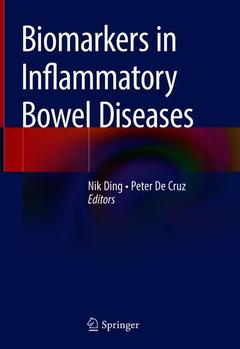Description
Biomarkers in Inflammatory Bowel Diseases, 1st ed. 2019
Coordinators: Sheng Ding Nik, De Cruz Peter
Language: English
Subjects for Biomarkers in Inflammatory Bowel Diseases:
365 p. · 17.8x25.4 cm · Hardback
Description
/li>Contents
/li>Biography
/li>Comment
/li>
This book provides a comprehensive and complete overview of biomarkers in clinical practice for inflammatory bowel disease (IBD) bringing together the literature in a clear and concise manner. The book bridges the gap between growing knowledge at the bench and current and future applications of biomarkers in clinical practice.
The central structure of the book focuses on prognostic and predictive biomarkers in IBD with an emphasis on the fields of research and scientific techniques (genomics, proteomics and metabonomics) that have led to biomarker discovery and places these biomarkers within a clinical context to help understand their utility in clinical practice.
This book will be of use to clinicians who have an interest in using biomarkers in clinical practice as well as clinician researchers and scientists involved in the biomarker research pipeline.
The author team comprises experts from around the world in order to bring together the literature in an effort to inform clinicians and researchers about the current state-of-the art in biomarker discovery. It is intended to assist future research efforts and indicate how biomarkers might be best applied to clinical practice both at present and in the future.
Part I: Introduction.-
1. Inflammatory bowel disease – more than meets the eye
2. Clinical risk factors – lessons from epidemiology
3. Clinical trial design for biomarker discovery
4. Database/ big data meets real world
5. Patient reported outcomesPart II: Biomarkers
6. Prognostic vs Predictive
7. Biomarkers for remote monitoring
8. Disease modification
Part IIV: Crohn’s disease
9. Luminal Crohn’s disease
10. Perianal CD
11. Fibrosis/ strictures in CD
12. Post-op Crohn’s disease
Part IV: Ulcerative colitis
13. UC surveillance
14. Acute severe UC
15. Chronic active UC
16. Pouchitis
17. Refractory proctitis
18. Feacal microbiota transplantation
19. Primary sclerosing cholangitis
20. Extraintestinal manifestations of IBD
Part V: Specialised scenarios
21. Pregnancy
22. Nutrition
23. TDM
24. Biomarkers to quantify immune response
25. Drug toxicity
Part VI:Scientific
26. Exposome and diet
27. Microbiota
28. Metabonomics
29. Immunology
30. Genomics
31. Systems Biology in Biomarker research
Part VII: Ideal tools for investigation in the future
The editors are currently reviewers of major international journals. They are experts in inflammatory bowel disease (IBD) each with an interest in developing biomarkers for research development and improving patient care. The editors have also developed strong reputations within the international IBD community and have connections with each of the nominated chapter contributors.
Nik Sheng Ding is a committee member for the European Crohn’s and Colitis Organisation (ECCO) and a clinical lecturer at Imperial College, London. He has supervised students and is a member of the Computational Medicine division of the department of medicine. He is completing a PhD entitled “Clinical and metabolic predictors of response to anti-TNF therapy in Crohn’s disease”. He has authored and co-authored manuscripts, book chapters and has a major grant from ECCO to conduct his research. He is currently the principal investigator of an international study into access to IBD investigations (biomarkers) by health professionals, particularly investigating rates of usage according to health expenditure and quality of care for patients (Access to IBD investigations – ACCID). Nik has an interest in translational research with investigating the function of the microbiome through metabonomics and it’s relation to outcomes in IBD.
Peter De Cruz MBBS, Ph.D, FRACP
Peter De Cruz is Director of the IBD service at the Austin Hospital, Senior lecturer at the University of Melbourne and Life Fellow of Clare Hall at the University of Cambridge. Peter’s doctoral research at The University of Melbourne identified the optimal strategy for preventing Crohn’s disease recurrence after resectional surgery. The findings of the research have been published in the Lancet and Gastroenterology and have changed practice internationally. His postdoctoral fellowship in complex IBD and clinical nutrition was undertaken between Addenbrooke’s Hospital, Cambridge and St Mark’s Hospital, LondIncorporates current biomarkers within practical algorithms that can be applied to clinical practice
Addresses predictive (early or ultra early) biomarkers of response to current therapeutic agents which form the backbone of medical therapy as well as prognostic biomarkers which predict disease course in inflammatory bowel disease
Presents the current state-of-the art in the research strategies that are being applied to biomarker discovery




